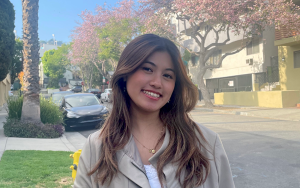
Just like the Chinese laundry stereotype persists so are many Filipinos who continue to be typeset as nurses or physician assistants. Often grouped as part of the model minority, Filipinos and other Asian Americans are not as well represented in engineering and science as people might think. Dagny Parayao, a second year computer science major at the UCLA Samueli School of Engineering, is determined to change the narrative.
An aspiring software engineer, the California native grew up in the city of Orange and knew first hand that early access to higher education is essential to future successes. At high school, she and other Filipino students lacked mentorship and resources to break into fields in science, technology, engineering and mathematics. Fortunately for Parayao, she benefited from her supportive parents and an older brother who had already gone through the American college application system.
Parayao taught herself basic HTML coding in middle school, creating webpages initially as a way to express her creativity. The experience showed her the power of coding, but it wasn’t until her software engineer father encouraged her to take a C++ programming class at her local community college did she contemplate pursuing software engineering as a career.
“It was really challenging, but when you solve a really hard problem for the first time, you get such a sense of pride and happiness that you want to keep doing more,” recalled Parayao of the programming class. “I realized I could take more of these classes throughout high school so why not just get an associate degree?”
With a high school diploma and an associate degree in computer science, Parayao said she decided to attend UCLA because of the school’s culture and collaborative spirit. However, she never forgot that for many from her community, the road to college was not as smooth. And it certainly wasn’t easy for her parents, who both immigrated to the U.S. from the Philippines. Her father had wanted to attend UCLA as a transfer student but didn’t know anything about the process until it was too late for him to apply. The frustrating experiences of her father and her peers from high school drove Parayao to take action.
She joined UCLA’s Filipino-affinity organization Samahang Pilipino in her freshman year and volunteered as a tutor for its high school and community college access project, Advancing Community Empowerment (SPACE). She continues to visit LA’s Historic Filipinotown weekly to tutor high school students in a variety of subjects.
Through SPACE, Parayao not only helped aspiring high schoolers and transfer students get ready for college, the student-run organization also helped her build confidence and overcome her imposter syndrome through its Pilipino Leadership Internship Program.
“It’s easy to look at all Asian Americans through the lens of the model minority but doing so ignores how diverse Asia truly is and the different factors that impact each community’s access to higher education,” Dagny Parayao said.
“There is so much that I think we could accomplish as a society if everyone had equal access to education, such as having people in power that properly represented our populations,” Parayao said.
In helping Asian American youth tackle their educational challenges, Parayao said she hopes to provide her students with a measure of support that she herself did not have in high school. Through proactive involvement and mentorship, she said, the Filipino community can be empowered to address economic challenges, educational resources and cultural divides that have often discouraged young Filipino Americans from pursuing higher education.
This desire to support fellow Filipino students was also borne out of Parayao’s own experience with the Google Kapwa Mentorship program. Kapwa means the unity of the self and others in Filipino and that concept guided members of the program to help Filipino engineering students navigate their careers. The experience of learning from seasoned professionals of the same cultural heritage, especially in a field where Filipino women continue to be underrepresented, left an indelible impression on Parayao, who said she plans to mentor students in a similar capacity.
“It can be very uplifting to see successful Pilipinx Americans in career fields we are not typically portrayed in,” Parayao said about her time with the program. “It was really meaningful to see successful Pilipinx, especially Pilipinx women in such a high-ranking company, and they were really supportive.”
In addition to her involvement in the Filipino affinity programs, Parayao also joined the Association for Computing Machinery as a design intern to revamp the website for Grades of Green — a nonprofit that mentors and equips students from around the world with the knowledge and leadership skills to create meaningful environmental change. She is also a web development director for UCLA’s Campus Events Commission, where she works at the intersection of arts and technology to create user-friendly websites for the organization in charge of producing some of the largest entertainment events on campus.
Since last summer, Parayao has been applying her technical skills through a software engineering internship at Northrop Grumman, working on an aerospace autonomous platforms project.
Through her myriad experiences at UCLA, Parayao says she sees building support for the underprivileged and underrepresented populations within the Asian Pacific American community as the common thread that connects everything.
“It’s easy to look at all Asian Americans through the lens of the model minority but doing so ignores how diverse Asia truly is and the different factors that impact each community’s access to higher education,” Parayao said. “We should support all Asian American students, with their specific community conditions in mind, so we can improve the diversity of higher education.”
